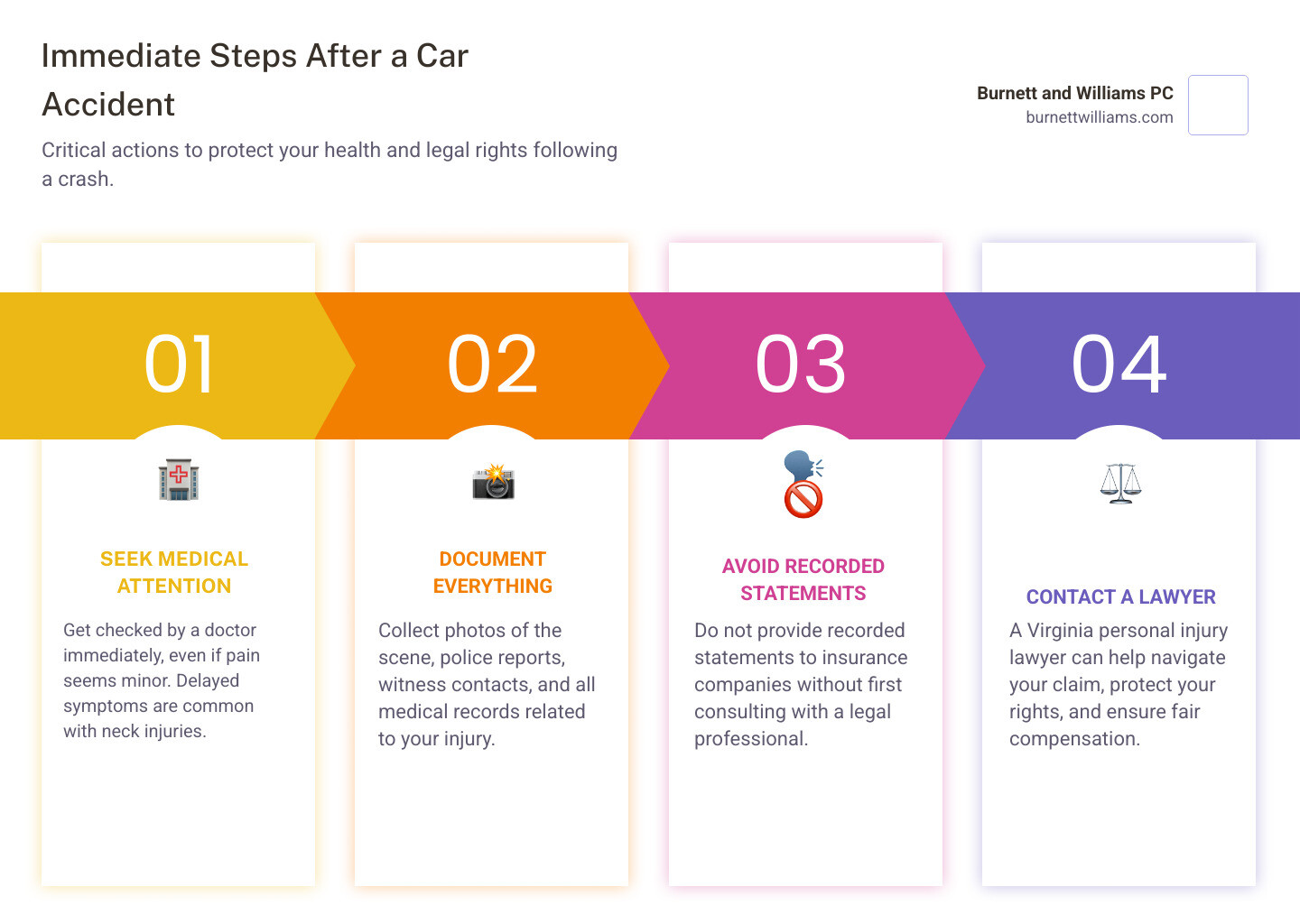Why Car Crash Neck Pain Requires Immediate Attention
Car crash neck pain can range from minor discomfort to a debilitating injury. If you’re experiencing neck pain after a car accident in Virginia, it’s crucial to act quickly. Neck injuries from crashes often have delayed symptoms, meaning what feels like minor stiffness today could become chronic pain.
Common neck injuries include:
- Whiplash: Damage to soft tissues from sudden head movement.
- Herniated discs: Spinal discs pushed out of place.
- Pinched nerves: Compressed nerves causing radiating pain.
- Muscle strains: Torn or overstretched neck muscles.
After an accident, you should:
- Seek immediate medical attention, even for minor pain.
- Document everything, including photos, medical records, and police reports.
- Avoid giving recorded statements to insurance companies.
- Contact a Virginia personal injury lawyer to protect your rights.
In Virginia, you have a limited time to file a claim. Insurance companies often argue that delayed symptoms are unrelated to the accident. Prompt medical care and legal guidance are essential to secure the compensation you deserve while you focus on healing.
The Immediate Aftermath: Understanding Whiplash and Common Neck Injuries
When a car slams into you, your head can snap backward and forward violently. This is whiplash, one of the most common injuries in Virginia car accidents. The sudden motion damages the soft tissues in your neck, including muscles, ligaments, and tendons, which aren’t designed for such extreme force.
A key challenge with whiplash is that symptoms often don’t appear immediately. You might feel fine at the scene but wake up the next day with severe pain. This delay can be used by insurance companies to argue your injuries aren’t related to the crash. That’s why seeking immediate medical attention is critical in Virginia, as any delay in treatment can jeopardize your claim.
Common Symptoms of Car Crash Neck Pain
Car crash neck pain is often accompanied by other symptoms that disrupt daily life:
- Neck pain and stiffness can make simple movements, like checking a blind spot, nearly impossible.
- Headaches often start at the base of the skull and can be persistent and debilitating.
- Dizziness and reduced range of motion may make you feel off-balance.
- Shoulder pain and arm numbness or tingling can signal that nerves in your neck are compressed or irritated.
- Fatigue and blurred vision can also occur as your body works to heal.
Types of Neck Injuries Beyond Whiplash
While whiplash is a common term for soft tissue damage, car accidents can cause several specific neck injuries:
- Herniated discs occur when the cushions between your vertebrae are pushed out of place, pressing on nearby nerves.
- Pinched nerves, or cervical radiculopathy, cause sharp, radiating pain, often described as electric shocks, that can travel down your shoulder and arm.
- Facet joint injuries affect the small joints connecting your vertebrae, causing localized pain that can radiate to your head or shoulders.
- Neck fractures are serious injuries requiring emergency treatment.
- Muscle strains, though they sound minor, can cause significant pain and disability.
All these injuries can have delayed symptoms. What starts as minor stiffness could become a chronic condition, making prompt medical evaluation essential for your health and any potential legal claim.
Diagnosis and Treatment Pathways in Virginia
After a Virginia car accident, getting prompt medical attention is vital for your health and your legal rights. Medical records provide essential proof connecting your car crash neck pain to the accident. Insurance companies often question injuries that aren’t documented immediately.
Your doctor will likely start by examining your neck’s range of motion, checking for tenderness, and testing your reflexes. To get a clearer picture, they may order imaging tests:
- X-rays can spot broken bones or major alignment issues.
- MRI scans are best for viewing soft tissues like muscles, discs, and nerves, and can identify herniated discs or pinched nerves.
- CT scans provide detailed bone images and can also show some soft tissue problems.
The Mayo Clinic’s guide to whiplash offers more medical information about what you may be experiencing.
Medical and Therapeutic Treatments
Your treatment plan will be custom to your specific injury. While short-term rest may be needed, gentle movement is encouraged to prevent stiffness. Common treatments include:
- Ice and heat therapy: Ice can reduce initial swelling, while heat can later relax tight muscles.
- Physical therapy: A therapist can guide you through exercises to restore range of motion and strengthen neck muscles.
- Chiropractic care and massage therapy: These can help with spinal alignment and muscle tension.
- Medication: Doctors may recommend anti-inflammatory drugs, muscle relaxants, or pain-relieving injections for severe cases.
- Neck braces: These are used sparingly, as prolonged use can weaken neck muscles and slow recovery.
Self-Care and Recovery at Home
Supporting your professional medical care at home is key to recovery. Once your doctor approves, you can incorporate gentle stretches to maintain flexibility. Maintaining good posture while sitting and sleeping is also crucial.
Simple ergonomic adjustments at your desk, like raising your computer monitor to eye level, can reduce daily strain. You should also modify your activities to avoid heavy lifting and take regular breaks to prevent re-injury.
Navigating a Virginia Claim for Car Crash Neck Pain
Filing a personal injury claim for car crash neck pain in Virginia involves strict rules that can make or break your case. You must understand these challenges from the start to avoid costly mistakes.
First, Virginia has a two-year statute of limitations for personal injury claims, which begins on the date of the accident. If you miss this deadline, you lose your right to seek compensation forever.
Second, Virginia follows the harsh contributory negligence rule. This means if you are found to be even 1% at fault for the accident, you are barred from recovering any compensation. It doesn’t matter how reckless the other driver was; any fault on your part can eliminate your claim.
Because of this rule, gathering strong evidence is critical. This includes:
- Comprehensive medical records documenting your injury and treatment.
- The official police report of the accident.
- Statements from any witnesses.
- A personal journal detailing how your pain affects your daily life.
Why Delayed Symptoms Can Complicate Your Virginia Claim
As mentioned, neck injury symptoms can be delayed. Insurance companies often exploit this, arguing that if you didn’t feel pain immediately, your injury must not be from the crash. They will scrutinize your medical records for any gaps in treatment to deny or minimize your claim. Proving causation, the direct link between the accident and your injury, becomes your biggest hurdle. Consistent medical care and documentation are your best defense.
Long-Term Complications and Future Damages
Some neck injuries lead to long-term issues like chronic pain, permanent nerve damage, or reduced mobility. A Virginia claim should account for not just current bills but also future damages. This can include future medical expenses, such as ongoing therapy or surgery, and lost earning capacity if the injury impacts your ability to work. Calculating these long-term damages requires strong medical evidence and expert testimony, which is essential for countering lowball settlement offers from insurers.
Frequently Asked Questions about Virginia Neck Injury Claims
After a car accident, it’s normal to have questions about your car crash neck pain and the claims process. Here are answers to some common concerns.
How long do I have to file a lawsuit for neck pain after a car accident in Virginia?
In Virginia, you have two years from the date of the accident to file a personal injury lawsuit. This is known as the statute of limitations. There are very few exceptions, so it is critical to act within this timeframe or you will likely lose your right to seek compensation.
What if the insurance company says my neck pain is just a minor sprain?
Insurance adjusters often downplay soft tissue injuries to minimize payouts. They might call your injury a “minor sprain,” but the pain and limitations can be severe. Proving the true extent of your injury requires strong medical evidence. MRI or CT scans can reveal damage not visible on X-rays, and detailed notes from your doctor are crucial. An experienced lawyer can use this evidence to demonstrate the true impact of your injury.
Can I still recover compensation if I was partially at fault for the accident in Virginia?
Unfortunately, no. Virginia follows a strict contributory negligence rule. If you are found to be even 1% responsible for the crash, you are barred from recovering any compensation from the other driver. Insurance companies use this rule to deny claims by finding any way to assign partial blame to the injured party. This is why it is essential to build a strong case proving the other driver was 100% at fault.
How a Virginia Personal Injury Lawyer Can Help
When you’re dealing with car crash neck pain, navigating Virginia’s complex legal system while trying to heal can be overwhelming. An experienced Virginia personal injury lawyer can protect your rights and manage the legal burdens so you can focus on recovery.
At Burnett & Williams PC, we handle all communication with insurance companies, preventing them from using tactics to minimize your claim. We understand Virginia’s harsh contributory negligence rule and know how to build a case that establishes the other driver’s full responsibility.
Our team gathers the necessary evidence to maximize your compensation, accounting for both current expenses and future damages like long-term medical care and lost earning capacity. This allows you to focus on what matters most: getting better.
With offices in Leesburg, Midlothian, Orange, Winchester, Culpeper, Hopewell, Richmond, and serving Northern Virginia, Central Virginia, and the Greater Richmond and Tri-Cities areas, we are here to help. If you are suffering from neck pain after a car accident, don’t wait.
If you or a loved one has been injured in an accident in Hopewell, Petersburg, Colonial Heights, or anywhere in the Tri-Cities region, Burnett & Williams is here to help. Our Hopewell office offers free consultations, and you never pay a fee unless we recover for you. Call (804) 458-7070 today to speak with a trusted Hopewell personal injury attorney.
Learn more about our approach to whiplash injury cases in Virginia


